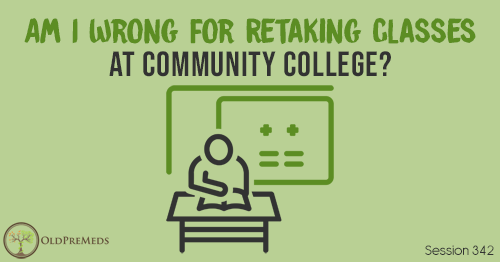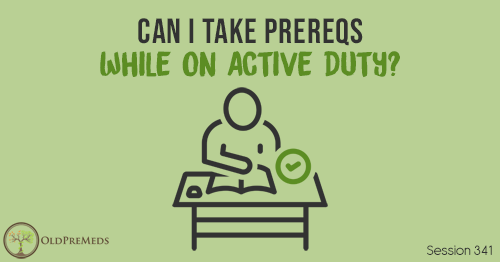Apple Podcasts | Google Podcasts

Session 231
When is it appropriate to complete postbac coursework at the undergraduate level, and when should you apply for graduate postbac or SMP programs? Let’s discuss!
Questions answered here on the podcast are taken directly from the Nontrad Premed Forum over at premedforums.com. Please go ahead and register for an account, ask your question, and have fun with the community.
Listen to this podcast episode with the player above, or keep reading for the highlights and takeaway points.
[01:59] How We All Can Move Forward as a Society
Before we go to our poster’s question, please check out Episode 393 of The Premed Years Podcast. I had a raw discussion with an African-American premed student who has been accepted to medical school.
I initially brought her on to talk about her interview journey which talked about on Twitter. She talked about the racism she encountered on her interview trail and just the things that happened along the way. Then we talked about the brutal killing of George Floyd in Minneapolis. And we talked about what students, who are not part of the minority or don’t come from disadvantaged backgrounds, can do to help society move forward. We talk about how to help our future classmates move forward and to be better physicians.
Last May 28, we had a 12-hour live stream on YouTube and on Facebook. Check out mappd.tv and you’ll find the first session of National Premed Day. I had an amazing discussion with three African American physicians from Tour for Diversity in Medicine. And that happened three days after the killing of George Floyd. We talked about what we can do as a society moving forward with that as well.
Also, please be sure to check out all our other podcasts on Meded Media as we try to bring you as many resources as you need on this journey.
[03:11] OldPreMeds Question of the Week
“I am a 25-year-old female who graduated from an undergraduate institution in 2017 with a BA in Biology (not sure why it wasn’t a BS as I took 102 BCPM credits but apparently it was just the degree offered). During school, I worked as a CNA and music librarian.
Since I graduated, I have been working as a medical scribe in a clinic, ER, and hospital which has helped solidify my desire to become a physician.
Recently, I started working as a pharmacy technician to be able to save up for application fees and tuition. I have been looking through various postbac programs, masters, SMPs, etc but have come to a standstill over the past couple of months in my spare time. I did okay in college (cumulative 3.37, science 3.13) due to needing to work throughout this time.
Freshman: cum. 3.47, science 3.18
Sophomore: cum. 3.04, science 2.75
Junior: cum. 3.63, science 3.49.
Senior: cum. 3.63, science 3.49.
I did take the MCAT in 2019 and got a 493. I am just not sure if I should go through an undergraduate postbac, graduate postbac, masters, or special master’s program. I understand the breakdown between the various programs but am looking for advice as to which program I should truly look into and apply for the fall of 2021. Any thoughts, advice, suggestions, or anything else is greatly appreciated. Thank you in advance!”
[04:44] Watch the Trend
The math doesn’t seem to make sense unless the junior and senior year credits weren’t a lot. But the math for a 3.47, 3.63, 3.63 cumulative with the one 3.04, the 3.37 cumulative looks a little bit low. But that’s the math.
So one bad year, potentially setting off this student. The question is, first off, do you need a postbac a master’s or an SMP? Do you need one?
A 3.17 or a 3.13 science GPA with an upward trend with those sciences of 3.49s the last two years cumulative 3.63 the last two years. That’s pretty darn good.
Overall, it doesn’t look great, but the trend is there and the trend looks good.
So the question is do you really need a postbac program at all? Do we need to improve grades? Now, obviously, the MCAT score is nowhere near where it needs to be.
[06:10] Reasons Students Are Not Doing Well on the MCAT
And that low of a score tells me either of these two:
- That this student doesn’t have the foundation to do well on the MCAT. And so potentially retaking some of those science courses will help.
- Or they were just so far removed from their courses having graduated in 2017 and taking the MCAT in 2019. They’re so far removed from those courses that they just didn’t refresh well enough.
Now, obviously, the MCAT is a test to see how well you can take the MCAT. But you need that foundational science knowledge to really help you do well on the MCAT.
'It's a critical thinking and reasoning test, but you need that science foundation to do well as well.'Click To TweetThere are a lot of reasons why a student wouldn’t do well on the MCAT. They may not have a good foundation in the sciences. They’re not taking enough practice tests. Or they’re not just understanding what the MCAT is all about.
My initial concern is that this student needs to take more of those undergraduate science courses. This way, they could learn how to be a better student, improve their study habits, and then translate that into preparing for the MCAT in a better way.
[07:25] How to Improve Your GPA: Undergrad Postbac vs. Master’s vs. SMP
It doesn’t really matter. At the end of the day, what a student needs to do is show that you can do well in medical school. That’s what medical schools want to see. They want to see an academic achievement in your transcripts that will hopefully translate into being a solid student in medical school.
“Depending on the school, they will have cut-offs. They will have different filters set up to screen out students at various steps along the way.”Click To TweetLuckily, this student is probably high enough that those filters aren’t going to come into play. Having a 3.37 cumulative is low but probably not too low to be filtered out. A 3.13 science GPA, again, probably not too low to be filtered out.
[08:31] Doing an Undergrad Postbac
If this student went and did an undergraduate postbac, that will affect their undergraduate GPA, but they’re not going to move it a ton. Once you have a degree, you have so many credit hours that your denominator is so big, it’s probably not going to affect your total GPA very much. It will affect your trend, and so the student can go from that.
If you can get that up to a 3.8 during a postbac, that will be a great trend. The medical schools can see and evaluate on.
[09:16] Doing a Graduate Degree
A graduate degree will be a completely separate line as is your postbac. But it’s a completely separate calculation for your GPA. The AACOMAS application can work in your graduate GPA into your undergraduate GPA for a total GPA.
But remember, what you see on paper when you print out your application can be unlikely. It is very different from how medical schools review your application.
Medical schools just get data points. They get all of the data that you put into the application. And they can sort and display and filter however they want. So they can only look at your Biology GPA. They can only look at your last 20 hours of science credits and they can remove a year of classes from your GPA, if you did poorly.
'How the medical schools look at your GPA is going to be different than how you can see your GPA when you print out your application.'Click To Tweet[10:38] What Matters Most
At the end of the day, it doesn’t really matter what you do SMP masters or undergraduate postbac.
What matters is that you do well and prove to yourself and the medical schools that you are academically capable of succeeding in medical school. Once they’re confident in that, then they can move on to the rest of your application and look at all the other amazing things that you are doing.
Until you prove that you’re academically capable of getting through medical school, then they don’t really care about any of the other stuff.
'What really matters is that you do well. You prove to yourself and you prove to the medical schools that you are academically capable of succeeding in medical school.'Click To Tweet[11:13] Financial Aid for Students
If you’re like a lot of students who I talk to, and they do an undergraduate postbac, a lot of times you can’t get financial aid for those. And so students are continuing to work and continuing to distract themselves from the very thing that they need to be doing – focusing on school and doing well.
A lot of students will look towards the Masters to get financial aid because financial aid is still eligible to them.
That way, they can have their school paid for and they don’t have to work or maybe work as much as they would in a different situation. And that way, they can finally show that they can be successful when they’re focused only on school, and not on everything else.
[11:58] Final Thoughts
Whatever you need to do to set yourself up for success, that is what you need you to focus on. Do well in your classes. Keep getting the experiences that you need to prove to yourself and to prove to medical schools that this is what you want. And get a better MCAT score.
Because at the end of the day, you need those things to get to the point where they care about everything else in your application.
Links:
PMY 393: Confronting Bias and Discrimination Towards Black Premeds











